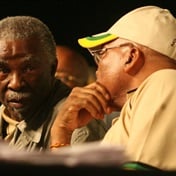The 107th anniversary of Africa’s oldest liberation movement has come and gone.
Those who were sceptical of just how shrewd President Cyril Ramaphosa was are now more persuaded that he is not a political lightweight.
Indisputably, for the governing party and the republic, there is a sense of direction.
The economy is beginning to show signs of life, and the opposition is still grappling to find a popular agenda against the leader of the new dawn.
Like comedians, political analysts are at pains to find working material. South Africa is in a good place; the matter at hand is to sustain the momentum.
But let me point to a lingering concern from which the final analysis should measure whether the new dawn is, in fact, the end of darkness for South Africa.
Literally and figuratively, South Africa has been in darkness for a decade.
In 2007, the long stretch of GDP growth came to end, the world economy tumbled into a messy crisis, and the Thabo Mbeki administration was unceremoniously booted out of power.
Between 2007 and 2017, inequality gaps became wider than they were during apartheid and unemployment rose from 23% to 26.6%.
During the same decade, the ANC fragmented into smaller parties, all of which joined the opposition; the opposition took over four of the country’s metropolitans, including the capital city Tshwane.
Several state-owned enterprises (SOEs) – such as public broadcaster the SABC, the Passenger Rail Agency of SA, SAA, power utility Eskom and PetroSA – became liabilities which required financial bailouts year on year, due to poor management.
The state capture tragedy was at the centre of it all.
Political assassinations, at least on municipal levels, started to skyrocket and, by 2017, crony capitalism had been deeply entrenched in the state.
Since 2015, the economy has grown at less than 1%, close to what Robert Reich refers to as the tortoise economy (near zero growth).
There is a broader truth to all the above. Between January and December 1960, a total of 17 African countries received independence.
New governments sought to deliver economic development, no less than what Nelson Mandela declared in his inaugural speech in 1994: “The people of South Africa have spoken in these elections. They want change! And change is what they will get.”
What followed Mandela’s (and Mbeki’s) efforts was one of South Africa’s most impressive growth stretches, peaking at an average of 5.2% between 2004 and 2007.
But keep in mind this was the case in sub-Saharan African countries between the 1960s and early 1970s, when the subcontinent’s combined growth averaged 4.8%.
Like South Africa after 1994, Africa’s growth fortunes were evident for a decade and a half.
Then, like South Africa, Africa’s lost decades started after 15 years of stability (in the late 1970s).
The decades which followed were the most conflict-ridden in the post-colonial history of the continent.
From the 1970s to the 1990s, Africa had experienced over 60 violent changes of government.
During these lost decades, liberation movements either lost power or used the military (as all dictatorial regimes do) to maintain their power, economic growth fell to negative in most African countries, SOEs fell apart due to mismanagement and those who opposed government were silenced through assassinations.
The crises of the past decade in South Africa seems to be a replica of Africa’s history, a reincarnation of Africa’s lost decades as it were.
If Africa’s post-colonial history is anything to go by, we should expect the ANC to implode and leave power in the next decade or so, or translate itself into a dictatorial regime.
The former is more likely, given South Africa’s strong judicial system. Ramaphosa’s presidency slows down the momentum but it does not eliminate this possibility altogether.
African economies rebooted in the 1990s, and spent roughly a decade turning around a rather wrecked economic ship.
For a decade, multilateral organisations spent the bulk of their budgets on pushing for what they called good governance.
In some ways the good governance discourse paid out in the turn of the century, following which the Africa Rising narrative became a discussion point.
If South Africa is to follow the path followed by its African counterparts, then turning the corner under the new dawn rhetoric should be aimed at achieving good governance.
The failure of SOEs, and a bloated state both result from multiple crises of governance. So does the remarkable and consistent financial mismanagement of municipalities.
How we proceed with the land issue is also a governance question.
The manifestos of major political parties, including the governing party, seem focused on a short vision of creating jobs and quicker delivery of basic services.
But while these are critical for any government, none of the major parties seems to locate South Africa in Africa’s historical context.
As a consequence, none of these parties seem to hold the sort of vision which formed the basis for the roaring of African economies today.
Of course good governance means different things to different interest groups, and governance in most African states is still weak and less democratic.
But for South Africa, good governance should mean creating efficient bureaucracy, capable of facilitating sustainable growth.
Most development challenges in South Africa would be resolved if the state was well governed.
But the good governance goal is out of reach until we hold a meaningful and thorough public conversation, however diverse the voices.
One way of doing it is making good governance our non-negotiable contract with politicians – even in the run-up to the general elections.
Musyoka is a development economist at the University of Pretoria’s Centre for the Advancement of Scholarship




 Publications
Publications
 Partners
Partners









